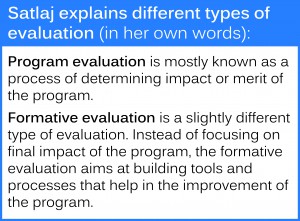Before joining the University, I was working in the community health sector of India. My work was focused on Community Health Worker (CHW) programs, where I was involved in training, curriculum development, and building management and support system structures for ASHA (Accredited Social Health Activists), who are Indian government-supported CHWs. ASHAs serve as “link workers”. They are a connection point between communities and health systems, providing basic health education and counseling to community members. This included providing first aid, and helping community members access government services.
My experiences made exploring a maternal and child health (MCH) MPH a natural fit. I looked at the MPH coursework being offered as an opportunity to enhance my skillset, and public health program evaluation seemed to be a practical skill to learn. So I decided to pursue my MPH in MCH and a minor in Program Evaluation.
 Besides being a student, I am also working as Graduate Research Assistant (RA) in the evaluation team of Deborah E. Powell Center and Upper Midwest Center for Agriculture Safety and Health (UMASH). At the Powell Center, I provide evaluation support for their various programs and projects. My work includes developing and maintaining databases, designing and administering surveys and feedback questionnaires, gathering and analyzing data, and disseminating results by creating reports and visualizations. At UMASH, I work with another fellow MCHer, Mi Lee, to develop an online reporting tool and database to capture outreach work of UMASH. Both of these positions give me excellent opportunities to build my skills in core evaluation competencies (including quantitative and qualitative data analysis, survey design, and data visualization). My on-the-job training at both of my RAships provide me with the time and space to learn data management software like MS Access, and online survey tools like Redcap and Qualtrics.
Besides being a student, I am also working as Graduate Research Assistant (RA) in the evaluation team of Deborah E. Powell Center and Upper Midwest Center for Agriculture Safety and Health (UMASH). At the Powell Center, I provide evaluation support for their various programs and projects. My work includes developing and maintaining databases, designing and administering surveys and feedback questionnaires, gathering and analyzing data, and disseminating results by creating reports and visualizations. At UMASH, I work with another fellow MCHer, Mi Lee, to develop an online reporting tool and database to capture outreach work of UMASH. Both of these positions give me excellent opportunities to build my skills in core evaluation competencies (including quantitative and qualitative data analysis, survey design, and data visualization). My on-the-job training at both of my RAships provide me with the time and space to learn data management software like MS Access, and online survey tools like Redcap and Qualtrics.
For my culminating experience, I am conducting formative evaluation for the Intercultural Specialist (ICS) Program of Eastern Carver County School district. The project is part of the University of Minnesota’s (UMN) Resilient Community Project. Intercultural specialists serve as a link between families belonging to ethnic minorities, and school administration and teaching staff. I am working with the ICS team to design objective and goal statements for the program, conduct a detailed situation analysis and create logic models for various components of the program. In addition to these assignments, I also worked with organizations such as Illusion Theater, Neighborhood House and Hennepin County Medical Center (HCMC) to support their program evaluations. Throughout, I received great coaching from my School of Public Health (SPH) mentors Dr. Eileen Harwood and Dr. Zobeida Bonilla.
I think program evaluation is an exciting and rewarding field for public health practitioners. Today, many non-governmental organizations (NGOs) are working in the area of community health, and they need evaluation expertise in the areas of early childhood health and development, maternal health, family support, healthy eating, environmental health, and more. It’s a great time to use our technical knowledge to design and implement program evaluations that help people understand the complexity of public health.
If you’re interested in pursuing your interest in program evaluation, the SPH is a great place to do so. The school offers great courses in qualitative and quantitative data collection, analysis, survey design, and research methods, and the Minnesota Evaluation Studies Institute (MESI) is a valuable on-campus resource for students interested in developing skills in program evaluation. For me, all of the above has made the UMN a great place to learn and thrive!
Satlaj Dighe is in her last semester of the MCH Program.
#UMNMCH #UMNdriven
